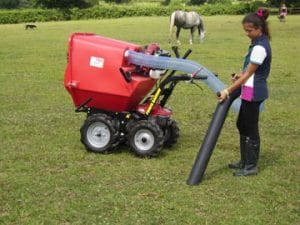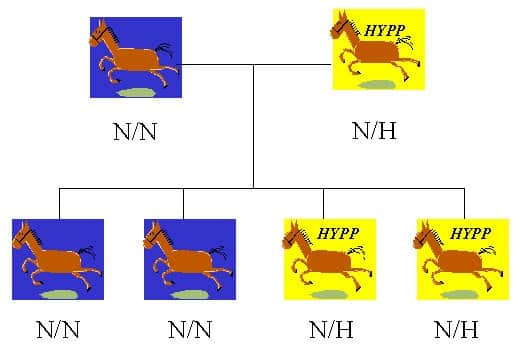 I have to admit, for most of my career, I thought that discussions about parasite control were pretty boring. Oh, sure, parasites were important, but at the end of the day, the approach to controlling parasites were driven by two main beliefs.
I have to admit, for most of my career, I thought that discussions about parasite control were pretty boring. Oh, sure, parasites were important, but at the end of the day, the approach to controlling parasites were driven by two main beliefs.
- Parasites are bad
- You have to deworm horses all the time (with something, sometimes)
All of that would have been just fine if parasites hadn’t had a say in the whole thing. Turns out parasites like to live, too, and rather than just go off and die when confronted with rotational/monthly/daily/in the feed/in a paste/in-a-shot sorts of strategies, their wiggly little bodies started to figure out how to develop resistance to the dewormers. As a result, of this, and in hopes of keeping deworming treatments effective for as long as we can, today, we veterinarians are now encouraging horse owners to be more selective in their use of dewormers, and only target certain parasites at certain times.
The current thinking is that we should use fecal egg counts to help manage the worm population inside the horse. Happily, fecal egg counts aren’t very hard to do. They’re not necessarily fun, but at least they aren’t hard. You just need some horse poop.
 CAN YOU STORE HORSE POOP WITHOUT AFFECTING THE FECAL TEST?
CAN YOU STORE HORSE POOP WITHOUT AFFECTING THE FECAL TEST?
As simple as it is to pick up some fresh road apples, there’s still a question of how quickly you need to run the fecal test. I mean, it would be awfully inconvenient if, say, a few hours after the poop has left the horse, the test were to become inaccurate. If, after a few hours out of the horse, the fecal eggs dissolved or something, the test wouldn’t be very useful at all. It would be pretty inconvenient, as well. So…. In the UK, at the University of Sheffield, researchers looked to see how different methods of storage affected the poop sample (I know “fecal” is the right word, but a rose by any other name smells as… well… not sweet).
They didn’t test freezing. Since water expands when it freezes, it’s generally thought that the expansion from freezing breaks up parasite eggs, making counts inaccurate. They did test preservative solutions such as formalin and ethanol: they’re preservatives, right? They tested refrigeration, too. Guess what they found?
 Preservative solutions are not good to parasite eggs. That is, if you store horse poop in preservative solutions, the egg count is lowered. Contrary to what you might think, putting road apples into preservative solutions ends up underestimating the egg count. Honestly, I’m glad for that, because most folks (including me) don’t keep a lot of formalin and ethanol around the house (at least not in their pure forms).
Preservative solutions are not good to parasite eggs. That is, if you store horse poop in preservative solutions, the egg count is lowered. Contrary to what you might think, putting road apples into preservative solutions ends up underestimating the egg count. Honestly, I’m glad for that, because most folks (including me) don’t keep a lot of formalin and ethanol around the house (at least not in their pure forms).
What most people do have around the house is a refrigerator. Here’s the good news. If you stick the horse poop in the refrigerator, egg counts will maintain for up to a week (just put it in a plastic bag, and don’t mix that bag up with anything else). Get the sample to your veterinarian within a week, you’ll still have an accurate fecal egg count on your horse, and your family will be glad to have a clean refrigerator. And if you want to see the study, here you go!
THAT’S GREAT, BUT WHAT DO WILD HORSES DO?
I think it’s interesting to think about what happens when horses aren’t dewormed, as happens in the wild. I mean, horses have managed to survive millions of years in the wild without someone sticking a tube full of medicine in their mouths. To find out what happens to wild horses who aren’t dewormed, Canadian researchers looked at 477 feral horses on an island in Nova Scotia. They found that horses – to me, not unsurprisingly – actually get along pretty well carrying some parasites. However, they did note that there was an inverse correlation between how parasites the horses had and their body condition. Otherwise stated, the more parasites the horses had, the worse their body condition (with any luck, this may not come as a total surprise to you). While that’s perhaps obvious, they did notices some interesting trends:
- The older the horse, the lower the parasite burden
- Mares that weren’t making milk had fewer parasites than mares that were
- In some areas, males had more parasites than females (although I had never heard this, some people have said that it’s always the other way around)
- Stallions that led harems had more parasites than did herds of bachelor males
- Where there’s more lush grass – that is, around water sources – there’s a good opportunity for parasite transmission; again, perhaps not the biggest surprise.
 There are a couple of important takeaways here, I think. One is that even if a horse is never dewormed (which I would not recommend, since deworming is also used to prevent parasite damage to internal organs) you can still get an idea if parasites are a problem by his body condition. It’s also interesting that older horses have reduced parasite loads, although knowing what we know, it does make some sense. The horse’s body does develop some immunity to internal parasites. Whether this same thing is seen in domesticated horses is anybody’s guess, however. Here’s the article, if you want to read more.
There are a couple of important takeaways here, I think. One is that even if a horse is never dewormed (which I would not recommend, since deworming is also used to prevent parasite damage to internal organs) you can still get an idea if parasites are a problem by his body condition. It’s also interesting that older horses have reduced parasite loads, although knowing what we know, it does make some sense. The horse’s body does develop some immunity to internal parasites. Whether this same thing is seen in domesticated horses is anybody’s guess, however. Here’s the article, if you want to read more.
NEW STRATEGIES TO DIAGNOSE AND CONTROL PARASITES?
Now there’s evidence of parasite resistance to all three of the current classes of equine deworming agents, what’s an enthusiastic dewormer to do? There’s nothing new in the drug pipeline. There are not any other chemical agents to call on. “Natural” deworming agents don’t work. The situation’s a bit scary, actually. In cases where egg counts don’t go down even in the face of deworming, what’s a horse owner to do?
Turns out that there are several possible options.
 You could consider giving agents from two different classes at the same time. That’s what people do in sheep. While doing this hasn’t really been tested yet in horses, at worst the practice is likely to be harmless, since deworming agents are largely pretty safe. Still, given how parasites are – wanting to live and all – the practice of giving two dewormers at the same time probably won’t work well in the long run.
You could consider giving agents from two different classes at the same time. That’s what people do in sheep. While doing this hasn’t really been tested yet in horses, at worst the practice is likely to be harmless, since deworming agents are largely pretty safe. Still, given how parasites are – wanting to live and all – the practice of giving two dewormers at the same time probably won’t work well in the long run.
There is talk of using a bacterial protein to kill strongyle parasites. The protein – called Cry5B – works in the test tube, but no one knows how well or if it works in horses yet. Finding out is going to take at least five years and half a million dollars. But it’s something.
 You could consider just monitoring the fecal egg counts and not doing anything unless things get bad. I mean, as icky as it sounds, a few parasites aren’t going to hurt your horse. Plus, as was seen in the wild horses, many horses develop an immunity to internal parasites over time. So one possible strategy would be to not deworm your horse unless the egg counts are going up: maintain a status quo, as it were. There are old-fashioned – and very useful – techniques, such as getting manure out of pastures, that help, too.
You could consider just monitoring the fecal egg counts and not doing anything unless things get bad. I mean, as icky as it sounds, a few parasites aren’t going to hurt your horse. Plus, as was seen in the wild horses, many horses develop an immunity to internal parasites over time. So one possible strategy would be to not deworm your horse unless the egg counts are going up: maintain a status quo, as it were. There are old-fashioned – and very useful – techniques, such as getting manure out of pastures, that help, too.
Veterinarians have figured out how to diagnose roundworm infections in young horses using ultrasound, so there’s that, if you’re so-inclined. For those of you that wonder what the tech industry is going to be up to next, there’s talk of a smartphone based fecal diagnostic and parasite management tool on its way for your veterinarian. Now there’s an app we’re sure to be whinnying for!
 To me, there’s some comfort to be gained from the fact while we definitely do need new deworming agents, equine internal parasites are generally less of an immediate health problem than most people fear. They can usually be managed, and horses usually manage pretty well with a few of them. It’s not necessary – or even possible – to try to achieve the goal of zero internal parasites in every horse by manic deworming. Each horses situation should be considered when coming up with a parasite control plan. For example, in southern California, where horses are kept in stalls and grass is a rare commodity, it can be very difficult for horses to acquire and transmit parasites; I’ve had horses in my practice that haven’t been dewormed for nearly a decade (they’re fine, and we check their manure). I mean, even if a medicine is mostly harmless, why give a medicine if a medicine isn’t needed?
To me, there’s some comfort to be gained from the fact while we definitely do need new deworming agents, equine internal parasites are generally less of an immediate health problem than most people fear. They can usually be managed, and horses usually manage pretty well with a few of them. It’s not necessary – or even possible – to try to achieve the goal of zero internal parasites in every horse by manic deworming. Each horses situation should be considered when coming up with a parasite control plan. For example, in southern California, where horses are kept in stalls and grass is a rare commodity, it can be very difficult for horses to acquire and transmit parasites; I’ve had horses in my practice that haven’t been dewormed for nearly a decade (they’re fine, and we check their manure). I mean, even if a medicine is mostly harmless, why give a medicine if a medicine isn’t needed?
I’ve written an article on control of the most common internal parasites and what to do about the less common ones While newer deworming agents will undoubtedly come along, those probably won’t be the solution, if the goal is to completely eliminate parasites. It’s nice to know that people are still working on the problem.








